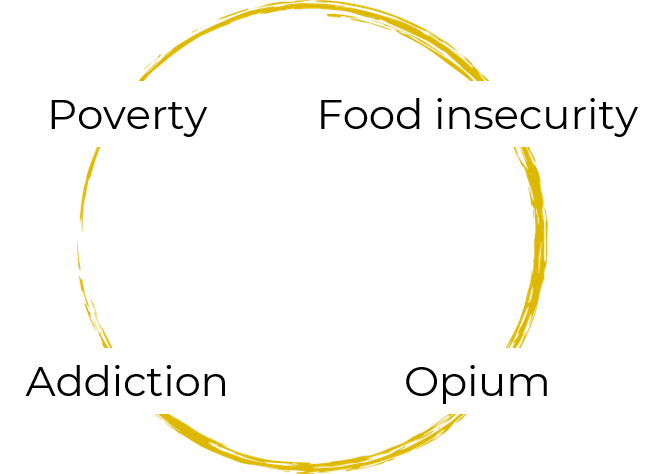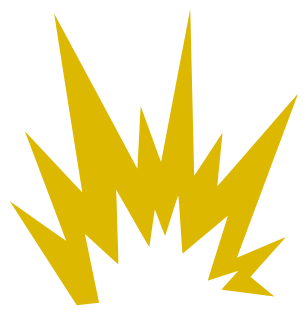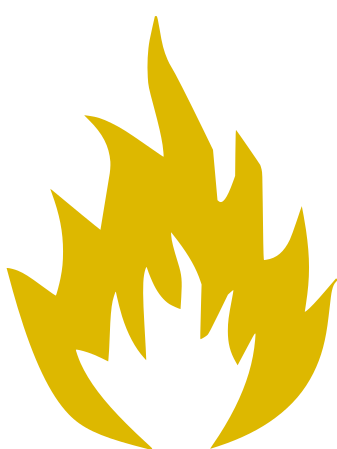Our Troubling Past
Opium, Poverty, War & Deforestation
Our history is dominated by poverty, opium and war.
All of these continue to affect our lives in different ways, and make it difficult to improve our situation.
Opium

Golden Triangle

opium cultivation

vicious cycle
Our villages are located in the so-called Golden Triangle, one of the main opium producing areas in the world. Throughout history, opium has affected our lives in many ways, and continues to do so. Most of us have a recent history as opium farmers, and some of us are still growing opium today.
While opium can provide a welcome source of income, it is a common misunderstanding that opium cultivation is a lucrative business. We grow opium because we are poor and lack alternatives, but opium does not help us escape poverty. Growing opium is extremely hard work, and the rewards are not large. We normally sell the opium to traders who come to our villages, and it is difficult to negotiate prices. We know that traders and other people can make a lot of money after they have refined the opium into heroin and smuggled it to other countries, but as farmers we remain poor.
Because so many people in our villages grow opium, most of us have friends or family who suffer from addiction. Some of them can live quite normal lives but many people and families also suffer a lot. Many opium smokers have very bad health and cannot work because of their addiction. This means that the family also suffers. Sometimes children have to look after their parents and when the parents cannot work the family has no income. In these cases, other people in the village try to help as much as they can, but we are all poor and it is difficult to cope.
We do not grow opium because we want to, but because we are poor and lack alternatives. We hope that through our cooperation in Vanmai Coffee, we will find an alternative source of income that can help us leave opium behind
Poverty

Food insecurity

limited water and electricity

Below the poverty line
Vanmai is located in Houaphanh province in Lao PDR, one of the poorest provinces in one of the poorest countries in the world. According to the government, 23% of the population is living in poverty and the situation is worse in remote areas like ours where economic development is restricted by poor infrastructure, limited market access and lack of commercial products and technology.
Our villages are located in mountainous areas, mostly without proper road access other than walking paths or unpaved and muddy roads that are difficult to use during the monsoon season. This limits our access to markets, education and health care. In many villages, the availability of clean water and electricity is also limited.
In addition to opium, most of us grow maize and upland rice. None of these crops can help us escape poverty. Mostly we grow rice for our own consumption, but since upland rice gives a much lower yield than lowland rice we sometimes have less food than we need. Sometimes we sell products to get extra income, mostly maize. However, since our villages are located in remote areas with difficult access, we are dependent on traders who come to our village to buy our products. This means we cannot negotiate prices and have to accept what is offered to us.
It is difficult to break out of this cycle alone. This is why we have decided to work together through Vanmai Coffee.
War

war

+ 2 million tons of bombs

dangers from unexploded bombs
During the war period in Laos, Houaphanh province was the centre of the communist Pathet Lao movement that after the war established the Lao People’s Democratic Republic. A large number of caves around the province provided bases and refuge for the Pathet Lao forces and the leaders of the movement. These caves can still be seen today, and have been developed into tourist destinations in Viengxay district.
As the base of the Pathet Lao, our province was affected by both ground fighting and heavy bombing. Heavy fighting took place around the provincial capital Xamneua and in the mountain of Phou Phati. Older members of our community can still remember this period, and some took part in the fighting.
While the war ended four decades ago, people are still affected by its legacy. During the war period, more than 2 million tonnes of bombs were dropped on Lao PDR, making it one of the most heavily bombed countries in the world. It has been estimated that around 30% of the bombs did not explode, and these unexploded ordnances continue to kill and injure people every year. This can be farmers working on their land or children playing with their friends. When people are not killed by the explosion, they are often left permanently injured.
Environmental Destruction

Illegal logging

land clearing

soil erosion
Our villages are located at high altitudes in the uplands of Lao PDR. In these areas, we used to have a lot of natural forest, which is important for the protection of water sources and the quality of the soil. However, over the last few decades the number of trees has started to decline very fast.
There are many reasons for this. Some people cut down trees to sell them, even though it is illegal. Most of us also grow maize and rice through what is called shifting agriculture. With this process we burn down the trees in the land we plan to use and use the ash as fertilizers. After a few years, we have to move to another area when the soil is exhausted. Over time this leads to large forest areas being cleared, especially since the population is increasing.
Deforestation is a big problem for us, since it threatens two of the things we are most dependent on: fertile soils and water. Since most of our agriculture takes place on sloping land, the layer of fertile topsoil is most of the time thinner than in the lowlands. This is partly because water flowing down the hillsides washes away the soil. Trees play an important role in protecting against this soil erosion, and when the trees disappear our soils become less fertile. In the same way, trees play an important part in improving soils structure, and in protecting water sources.
In other words, we are very dependent on having enough trees and forest.
This is one of the reasons we have decided to grow coffee. Coffee is a permanent crop that can be grown in the same place for many years without moving. We hope that in the future coffee and other permanent crops can play a role in reducing deforestation.